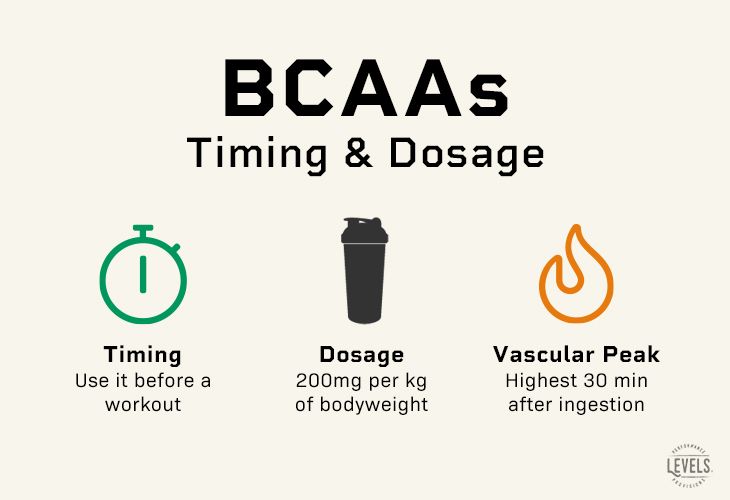Both highly trained athletes and everyday fitness enthusiasts often supplement with branched-chain amino acids (BCAAs).
Some evidence shows that BCAAs may help build muscle, reduce workout fatigue, and decrease muscle soreness after exercise.
People often wonder how best to time BCAA supplements around their exercise regimen to reap the desired health benefits.
This article takes a closer look at BCAA supplements, as well as how and when to take them.
What are BCAA supplements?

You can buy either BCAA capsules or powders that you mix into water or other liquids.
BCAAs include three essential amino acids: valine, leucine, and isoleucine — all of which have a branched chemical structure .
The supplements typically supply twice as much leucine as isoleucine or valine, which is sometimes referred to as a 2:1:1 ratio. This is because leucine may be especially good at stimulating protein synthesis and suppressing the breakdown of muscle protein .
However, scientists are still researching whether BCAA supplements offer a measurable advantage for physically active people, compared with whole protein powders and whole food protein sources that contain BCAAs.
At the least, supplements are a portable, more convenient option.
SUMMARY
BCAA supplements contain the branched-chain essential amino acids leucine, isoleucine, and valine, typically in a 2:1:1 ratio. Though these supplements are convenient, scientists question whether they offer an advantage over food sources of BCAAs.
How BCAA supplements may help your fitness regimen
Research suggests that BCAA supplements may support your exercise regimen in at least five ways:
- Reduce fatigue during exercise. Higher levels of BCAAs help limit the entry of tryptophan into your brain. Your body uses tryptophan to make serotonin, which may contribute to exercise fatigue .
- Reduce muscle damage and soreness. BCAAs may relieve soreness resulting from the strain and inflammation caused by exercise.
- Promote muscle building after exercise. Dietary protein containing BCAAs stimulates the synthesis of protein in your muscles and suppress the breakdown of muscle protein.
- Provide a source of energy during prolonged exercise. When glucose — your muscles’ main energy source — becomes low, BCAAs can serve as a source of energy.
- Support immunity. Strenuous exercise can result in reduced immunity, which may be due to a decrease in the amino acid glutamine, a fuel for immune cells. BCAAs can be converted into glutamine in muscles .
SUMMARY
BCAA supplements may promote muscle building, supply energy, support immunity, and reduce exercise fatigue and post-exercise muscle damage.
Science-based evidence for when to take BCAA supplements
There’s little research comparing the benefits of taking BCAAs or other protein supplements at one time over another, such as before exercise versus after exercise.
Here’s a review of the evidence on BCAA supplement timing.
Before or after exercise
Only one small preliminary study has compared the effect of taking a BCAA supplement before exercise to taking it after exercise.
In the study, young men took 10 grams of BCAAs before a strengthening exercise for their nondominant arm. They experienced less muscle soreness after exercise and lower blood markers of muscle damage than those who took the BCAAs after the arm exercise.
The only other study available for comparison is one that gave athletic men 25 grams of whey protein isolate (supplying 5.5 grams of BCAAs) either right before or right after their weightlifting workouts for 10 weeks.
In this study, both groups had the same improvements in body composition and strength .
Based on the available evidence, it’s uncertain that it makes a difference whether you take BCAAs before or after resistance (weight training) exercise.
Window of time to take BCAAs
BCAA levels in your blood peak 30 minutes after consuming the supplement, but studies have yet to determine the optimal time to take it.
Despite the long-held theory that you have about 45–60 minutes after exercise to get maximum muscle building benefits from consuming protein, newer research suggests this window of time may be as wide as 5 hours after exercise.
Furthermore, if you’ve eaten a meal or taken a protein supplement 1–2 hours before exercise, the timing of post-exercise BCAAs or other protein supplements may be less important than if you exercised without recently eating, such as in the early morning.
BCAA supplements are convenient enough that it’s simple to consume them shortly before or after a workout if you feel it makes a difference for you.
During exercise
Taking BCAAs during workouts has been studied a little in endurance training, such as distance running and cycling.
When 193 men taking part in a marathon took 16 grams of BCAAs during the event, they didn’t run any faster than men who took a placebo .
Additionally, research in cyclists has failed to show an improvement in physical performance from taking BCAAs during endurance exercise, though the supplements may help reduce mental fatigue .
SUMMARY
Research to clarify the optimal time to take BCAAs is limited. It may not make much difference whether BCAA supplements are taken before or after exercise, and you may not need to time them precisely to support muscle building.
Other factors that may enhance BCAA effectiveness
In a recent review of studies, scientists found that three factors seemed to be important for limiting exercise-related muscle damage through BCAA supplements.
First, you may need to consume a daily dose of at least 91 mg per pound (200 mg per kg) of body weight.
For example, if you weigh 165 pounds (75 kg), you would need to take a dose of at least 15 grams (15,000 mg) of BCAAs daily.
Second, you’d need to continue your BCAA supplement regimen over the long term (more than 10 days) to see significant muscle-protective benefits.
This also means taking the supplement every day instead of only on days that you exercise.
Third, how frequently you take the supplement may be a factor. In other words, splitting your total daily dose into two or more doses, such as before and after exercise, may be beneficial.
Lastly, keep in mind that you need more than BCAAs to build muscle protein. There are six other essential amino acids you must consume so your body can make protein. So, including other sources of protein in your diet is crucial.
SUMMARY
Muscle-protective benefits of BCAA supplements may be more likely if you take 91 mg per pound (200 mg per kg) of body weight daily, including on non-exercise days. It may also help to split your daily BCAA supplement intake into two or more doses.
The bottom line
BCAA supplements conveniently provide muscle-supportive nutrients. However, scientists question whether these supplements offer an advantage over food sources.
Research that directly compares the benefits of taking BCAAs over other protein supplements at one time over another is limited.
Taking BCAAs before or after exercise may be equally effective in providing muscle protection.
Also, you may not need to time them precisely to support muscle building.
Getting an adequate dose based on your body weight is essential, as well as continuing to take them in the long term, including on non-exercise days.


